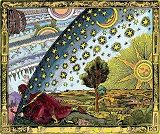Wisdom
Scientists - On Themselves and On Their Colleagues
The Wisdom of Science
Posted December 13, 2014
When shall I cease from wondering?

When shall I cease from wondering?
– Galileo Galilei (1564–1642), Italian discoverer of Jupiter's moons, sunspots, and much more
I thank thee, O Lord, our Creator, that thou hast permitted me to look at the beauty in thy work of creation; I exult in the works of thy hands. See, I have completed the work to which I felt called; I have earned interest from the talent that thou hast given me. I have proclaimed the glory of thy works to the people who will read these demonstrations, to the extent that the limitations of my spirit would allow.
– Johann Kepler (1571–1630), German discoverer of the laws of planetary motion
As soon as I was old enough to throw off the yoke of my teachers, I dropped the study of letters, and, resolving to pursue no knowledge anywhere but within myself or in the great book of life, I spent the rest of my youth traveling.
– René Descartes (1596–1650), French mathematician, whose pronouncement "Cogito ergo sum" [I think, therefore I am] is claimed by some to have opened the way to scientific progress, and by others simply to have spawned more derivative quotations than any other saying in history, with the possible exception of T. S. Eliot's epitaph for humankind: "Not with a bang but a whimper."
The man who opens for the first time a doorway into the future and who hears faint and far off, like surf on unknown reefs, the tumult and magnificence of an age beyond his own is confronted not alone with the scorn of his less perceptive fellows, but even with the problem of finding the words to impose his vision upon contemporaries inclined to the belief that the world's time is short and its substance far sunk into decay.
– Loren Eisely (1907–1977), science writer describing Sir Francis Bacon, the first great statesman of science. The description fits many scientific forerunners.
Newton regarded the universe as a cryptogram set by the Almighty. By pure thought, the riddle, he believed, would be revealed to the initiate.
– John Maynard Keynes (1883–1946), English economist
I do not know what I may appear to the world, but to myself I seem to have been only like a boy playing on the seashore, and diverting myself in now and then finding a smoother pebble or a prettier shell than ordinary, whilst the great ocean of truth lay all undiscovered before me.
If I have seen farther it is by standing on the shoulders of giants.
– Isaac Newton (1642–1727), great English physicist. When not speaking for posterity he was often not so humble.
I transmit but I do not create; I am sincerely fond of the ancient.
– Confucius (551–479 BCE), as transmitted by John A. Wheeler
Every other Jewish mother in Brooklyn would ask her child after school: "So? Did you learn anything today?" But not my mother. "Izzy," she would say, "did you ask a good question today?"
– Isidore I. Rabi (1898–1988), American Nobel-laureate physicist and scientific statesman, famous for his puckish humor. At 77 he gave his age as "three score plus ten plus ten percent."
A good scientist is a person in whom the childhood quality of perennial curiosity lingers on. Once he gets an answer, he has other questions.
– Frederick Seitz (1911–2008), American physicist, who could well have been describing I. I. Rabi
The best scientist is open to experience and begins with romance—the idea that anything is possible. Touch a scientist and you touch a child.
– Ray Bradbury (1920–2012), American science-fiction writer
To create a true sketch of my life is impossible, since leaving out relations with women in my case creates on the one hand a great void, and on the other hand seems to be required, firstly on account of scandal, secondly because they are hardly of sufficient interest, thirdly because in such matters no man is really completely sincere and truthful, nor ought he to be.
– Erwin Schrödinger (1887–1961), Austrian physicist, creator of wave mechanics and a lover of women. Though acknowledgment of the role of lovers in the creative arts is not uncommon, Schrödinger's avowal of the importance of his relationships with women to his creative process is rare among scientists. Walter Moore, in his biography Schrödinger: Life and Thought, breaks new ground by writing about his subject's scientific life and his love life. Both were prodigious.
There are two kinds of Nobel prize winners: the kind that make the prize famous, and the kind that are made famous by the prize. I am of the latter variety.
– Polykarp Kusch (1911–1993), American Nobel-laureate physicist, remembered with amusement by dozing students at whom he threw chalk.
I am actually not at all a man of science, not an observer, not an experimenter, not a thinker. I am by temperament nothing but a conquistador—an adventurer.
– Sigmund Freud (1856–1939), Austrian neurologist and founder of psychoanalysis
One is never again as intelligent as one is at sixteen.
– Leo Szilard (1898–1964), Hungarian-born American nuclear physicist. Szilard drafted the historic letter which Einstein sent to President Roosevelt alerting him to the possibility of building an atomic bomb.
I learned much from my teachers, more from my colleagues, and / most of all from my students.
– Eugene P. Wigner (1902–1995), Hungarian-born American Nobel-laureate nuclear physicist, quoting from the Talmud
But it isn't even wrong.
Wolfgang Pauli (1900–58), Austrian-born American Nobel-laureate physicist. Pauli, famous for his acerbity, is said to have made this comment at the conclusion of a seminar he found boring. I once saw him reduce a post-doctoral fellow, who'd just presented his latest work, to tears. Robert Oppenheimer, taking pity, interceded and shut Pauli up, to the immense relief of the audience.
I've just been reading some of my early papers, and you know, when I'd finished I said to myself, "Rutherford, my boy, you used to be a damned clever fellow."
– Ernest Rutherford (1871–1937), British pioneer nuclear physicist
Let us have ”sweet girl graduates” by all means. They will be none the less sweet for a little wisdom; and the ”golden hair” will not curl less gracefully outside the head by reason of there being brains within.
– Thomas Henry Huxley (1825–1895), English biologist poking fun at those who opposed admitting women to University.
To the professor, whose name I do not know, who was the only one to vote for my admission to the school, thus protesting the prejudice which would exclude women from advanced studies.
– Mary Corinna Putnam Jacobi, first woman graduate of the École de Médecine in Paris. This is the dedication to her doctoral dissertation presented in 1871.
It is to be regretted that she had been induced to depart from the appropriate sphere of her sex and led to aspire to honors and duties which, by the order of nature and the common consent of the world, devolves alone upon men.
– Boston Medical and Surgical Journal, commenting upon the award of an M. D. degree to Elizabeth Blackwell, the first woman doctor in the United States.
The world cannot afford the loss of the talents of half of its people if we are to solve the many problems which beset us.
Whatever women do, they must do twice as well as men to be thought half as good. Luckily, this is not difficult.
– Rosalyn Yalow (1921–2011), Nobel-laureate medical researcher
It would be expected that the discovery of imaginary numbers, which seem nearer to madness than to logic and which, in fact, has illuminated all mathematical science, would come from such a man whose adventurous life was not always commendable from the moral point of view, and who from childhood suffered from fantastic hallucinations ... .
– Jacques Hadamard (1865–1963), French mathematician, speaking of Jerome Cardan, who introduced imaginary numbers into mathematics in the seventeenth century.
The longing to behold harmony is the source of the inexhaustible patience and perseverance with which Planck has devoted himself to the most general problems of our science. The state of mind which enables a man to do work of this kind is akin to that of the religious worshipper or the lover; the daily effort comes from no deliberate intention or program, but straight from the heart.
– Albert Einstein speaking of Max Planck (1858–1947), German Nobel-laureate physicist, father of modern quantum theory
As an older friend I must advise you against it for in the first place you will not succeed; and even if you succeed, no one will believe you.
– Max Planck to Einstein upon learning of his intention to develop a general theory of relativity.
Anybody who has been seriously engaged in scientific work of any kind realizes that over the entrance to the gates of the temple of science are written the words: Ye must have faith. It is a quality which the scientist cannot dispense with.
– Max Planck
When I choose post-doctoral students to work with me now, I tend to choose the ones who are most energetic. They all know enough and most are bright enough. But to make brilliant discoveries, you have to be hardworking. If you're awfully bright, it may help. But mostly you have to be willing to do the work and to persevere through periods of doubt.
– Vera C. Rubin, American astronomer
Newton himself was better aware of the weaknesses inherent in this intellectual edifice than the generations which followed him. This fact has always roused my admiration.
Only the genius of Riemann, solitary and uncomprehended, had already won its way by the middle of the last century to a new conception of space, in which space was deprived of its rigidity, and in which its power to take part in physical events was recognized as possible. (Bernhard Riemann (1826–1866), German mathematician, created the non-Euclidean geometry Einstein used to formulate his general theory of relativity.)
[Bohr] utters his opinions like one perpetually groping and never like one who believes he is in possession of definite truth.
I sometimes ask myself how it came about that I was the one to develop the theory of relativity. The reason, I think, is that a normal adult never stops to think about problems of space and time. These are things which he has thought of as a child. But my intellectual development was retarded, as a result of which I began to wonder about space and time only when I had already grown up.
I live in that solitude which is painful in youth, but delicious in the years of maturity.
I want to go when I want. It is tasteless to prolong life artificially. I have done my share, it is time to go. I will do it elegantly.
– Albert Einstein (1879–1955). The last of these Einstein quotes was spoken to his housekeeper after Einstein had suffered a stroke. He refused all suggestions for an operation and died within a few days.




